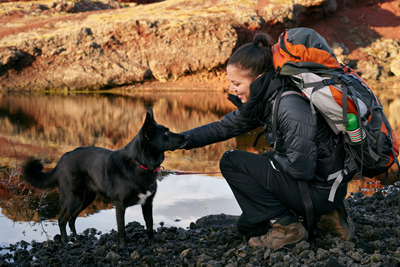There are several steps you can take to help your dog cope with various situations.

Photo credit: dashabelozerova/Adobe Stock
Have you ever taken your dog somewhere and wondered if he’s having a good time? If you know canine body language, it’s not hard to tell. A dog who is having fun has an alert expression on his face. His eyes are bright, his ears are up and he moves with purpose and confidence.
A stressed-out dog, however, is a whole other story. When a dog is in a situation he can’t handle, he will let you know it. Some dogs react submissively by putting their ears down and tucking their tails between their legs. They might flick their tongues out repeatedly, avoid looking you in the eye and could even cower.
Some dogs react to stress with a more aggressive posture. They might bark obsessively, dart around at the end of the leash and even become aggressive toward people or other dogs.
How do you handle it when your dog is stressed out? What can you do to help him relax? Here are a few tips to help your dog distress.
Know Your Dog
First off, try to avoid exposing your dog to situations you know he can’t handle. Loud noises, throngs of people and a bunch of other dogs in close quarters can be big triggers for many dogs, especially if they haven’t been well socialized.
Calm Your Dog

Photo credit: Daxiao Productions
If your dog is showing signs of fear and stress, reassure him that everything is OK. Resist your first impulse to stroke him gently while quietly telling him “It’s OK, don’t be scared.” Your dog can interpret this kind of reaction as a reward for being stressed out, so handling it this way could make it worse. Instead, show your dog there’s nothing to be worried about. Speak reassuringly to him in an upbeat voice. Give him some pats rather than stroking him and act confident yourself. Because he sees you as his leader, he will take his cue from you.
Rescue Your Dog
Some situations are just too much for dogs to handle. Even the most well socialized dog can become very stressed out over the sounds of fireworks or gunshots, for example. If your dog is extremely stressed in a situation, take him out of it. You don’t want to traumatize him.
Consider Medication
If you have a very high-strung dog who can’t handle traveling, strange people coming over or thunderstorms, talk to your veterinarian about medication. Acepromazine, Xanax and other prescription sedatives can help your dog feel calm when he might otherwise freak out.
You can also consider Dog Appeasing Pheromone (DAP) or Adaptil products that mimic the soothing scents emitted by a mother dog to help calm her puppies.
Expose Your Dog
To help your dog learn to cope better in stressful situations, gradually expose him to these events in small doses, offering lots of praise and treats when he endures them without coming unglued. This is best practiced when your dog is a puppy, but no dog is too old to learn to rely on you for comfort when he’s feeling stressed out.
About the Author: Audrey Pavia is an award-winning freelance writer and author of “The Labrador Retriever Handbook.” She is a former staff editor of Dog Fancy, Dog World and The AKC Gazette magazines. To learn more about her work, visit www.audreypavia.com and hollywoodhoofbeats.net/





